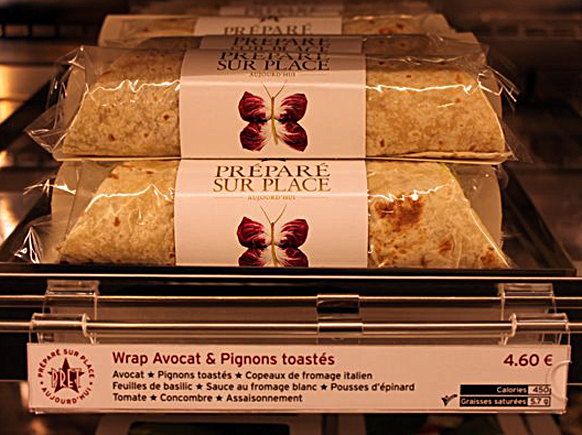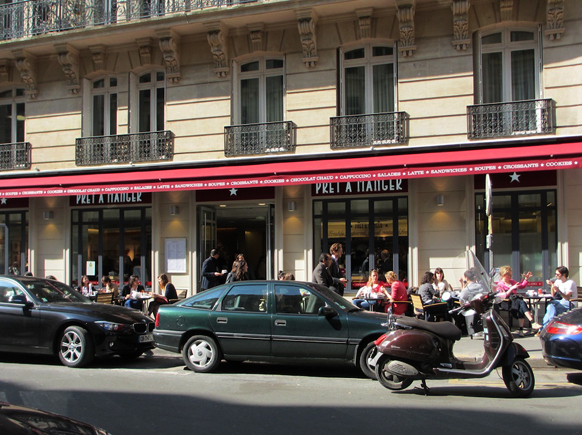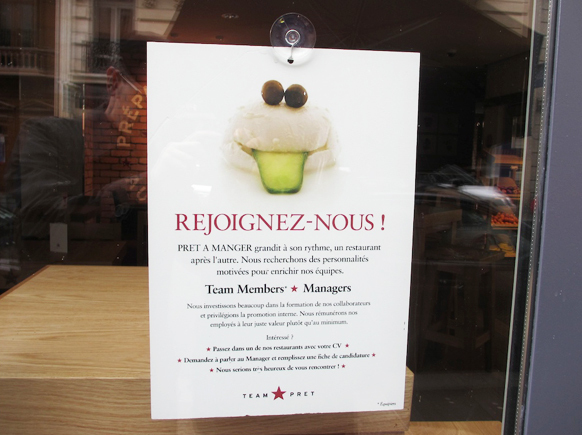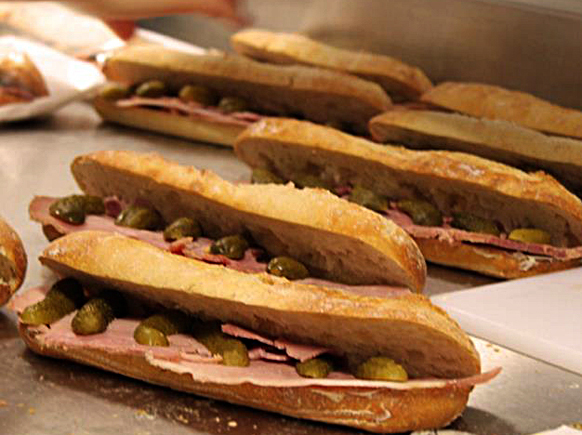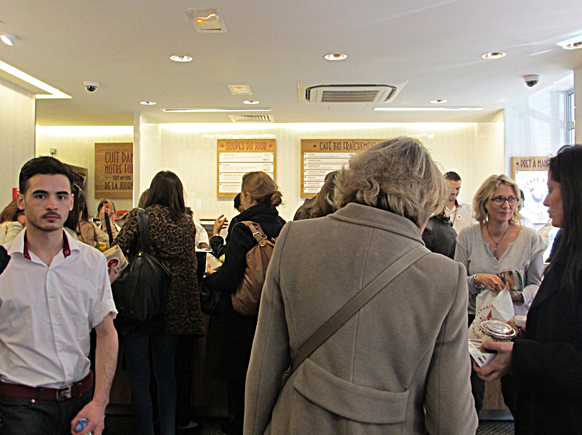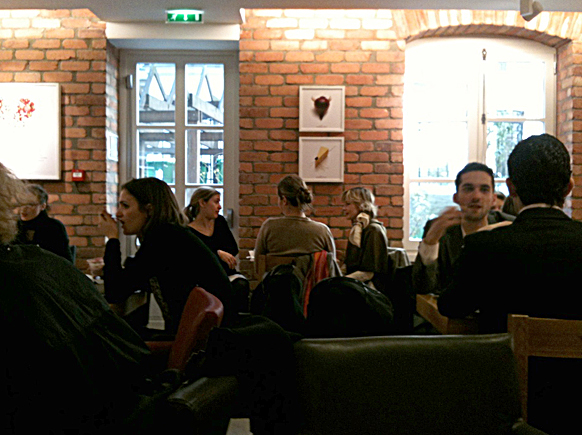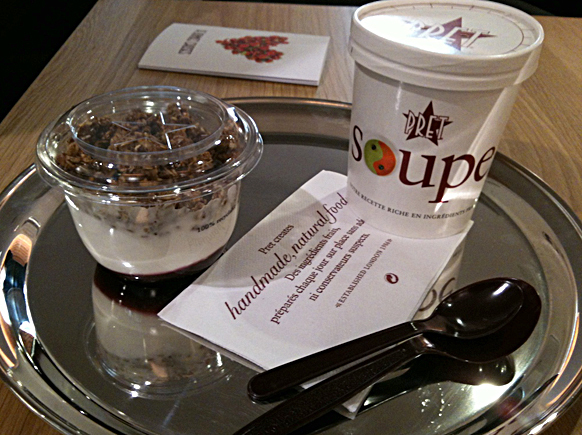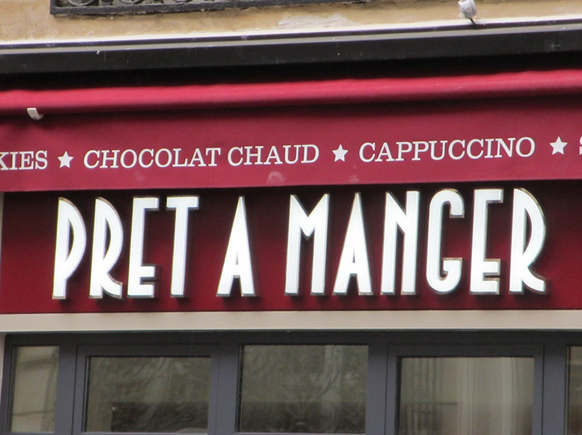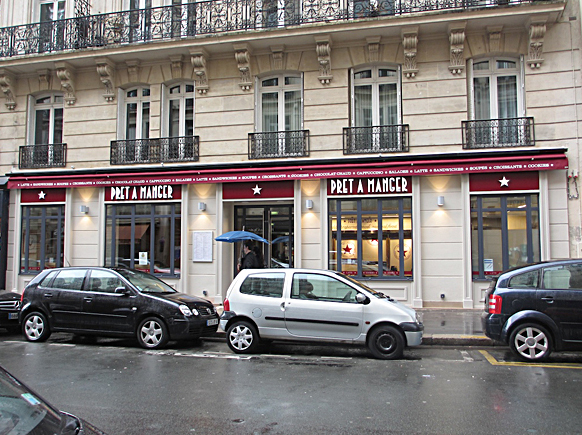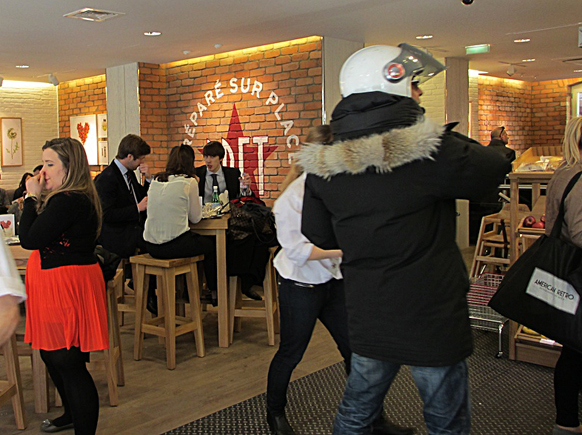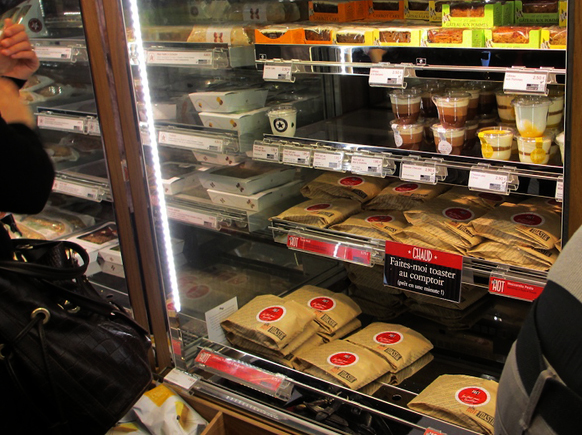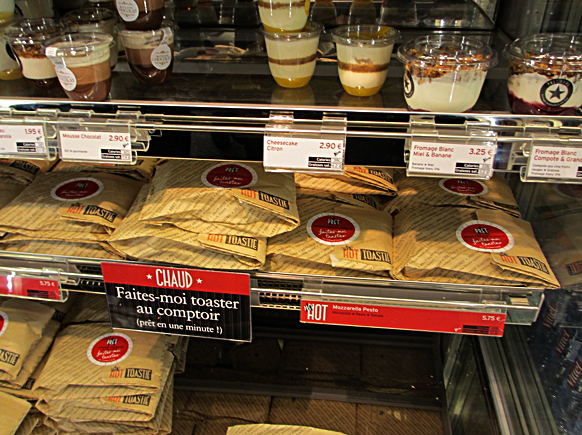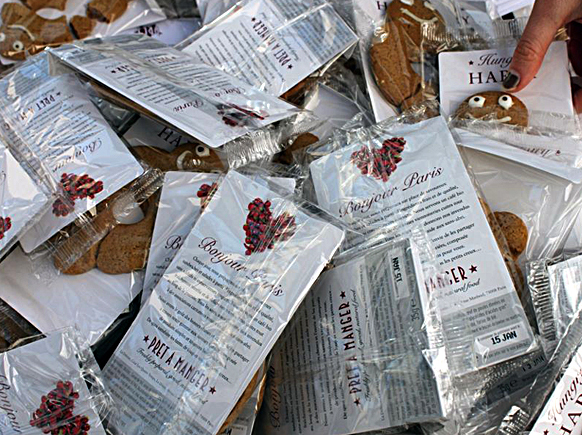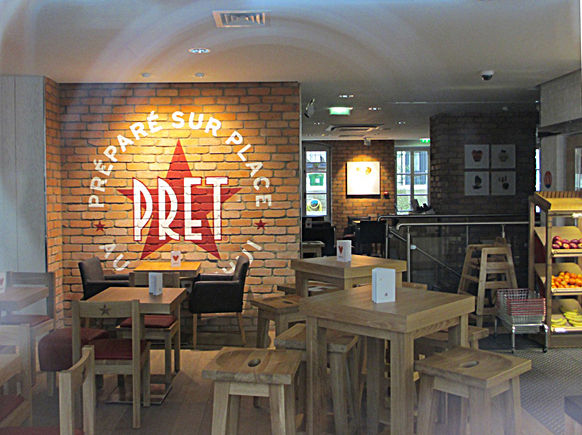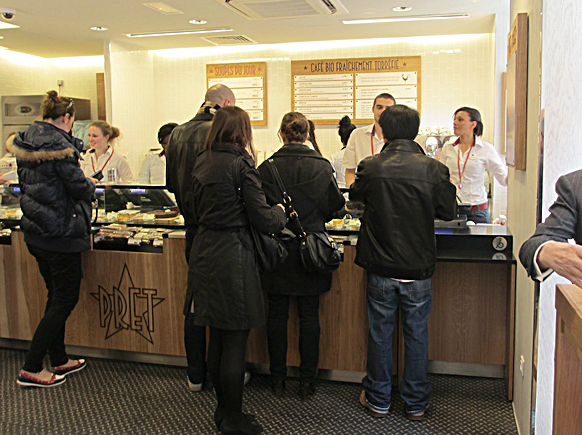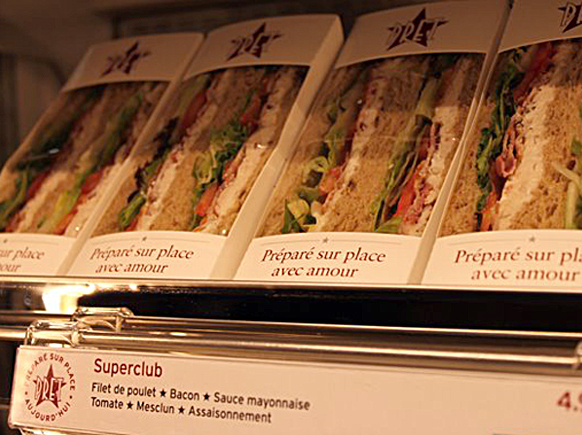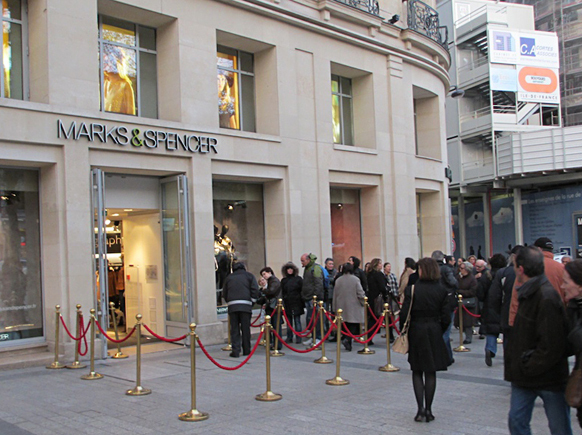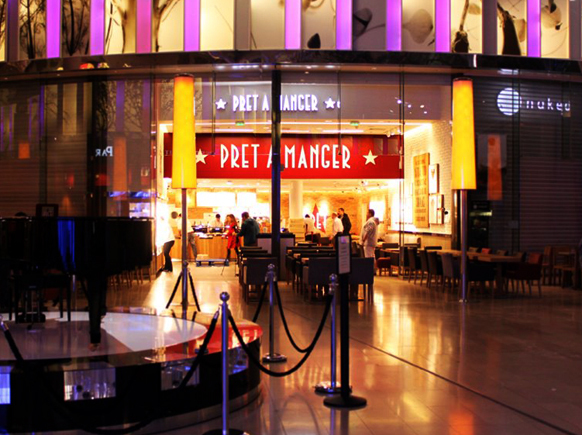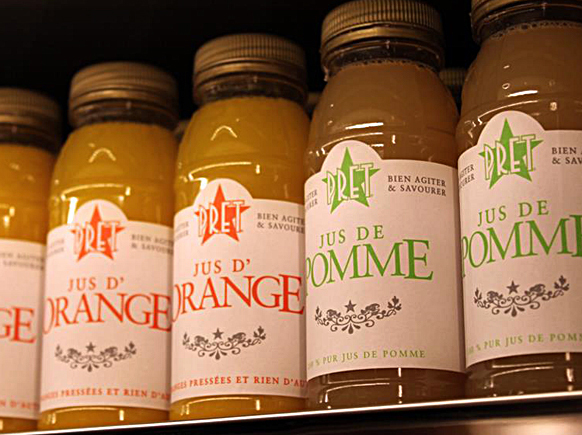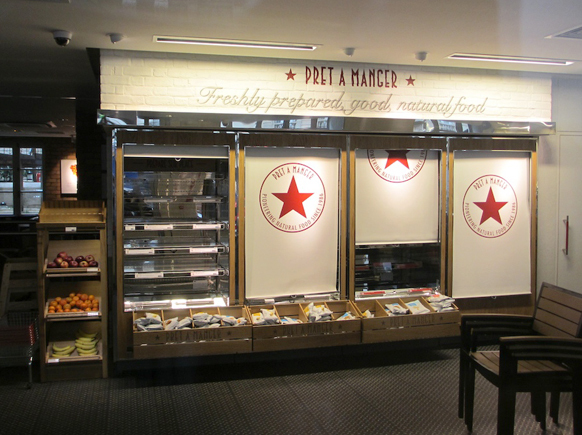Paris, capital of the fast food revolution!
If you don’t see the City of Light as a fast-food mecca, you’re behind the current media buzz. Predictably, our “fast food explosion” corresponds to the average worker’s sinking pouvoir d’achat. Other reasons cited for the trend of eating sur le pouce (“on the go”) revolve around ‘Anglo-Saxon’ impositions: shorter lunches, long commutes and the need to use lunchtime for errands.
McDonald’s has been big in Paris since the late Seventies. But recent years have seen many French-born competitors, such as the chains Brioche Dorée, La Croissanterie and Pomme de Pain. The sharp edge of the Anglo-Saxon wedge, however, has finally arrived. It takes the form of England’s famous sandwich triangle, presented by no less than Pret-A-Manger.
Along with bad chocolate and inferior butter, this item is iconic to French views of the British. It features in every warning when Parisians move to London. Not only is l’incontourable triangle damp and tasteless. Giving in to its ubiquitous presence means gaining weight.
Pret-A-Manger is attempting to overhaul that image. The company actually came to town late last year, shortly after Marks & Spencer’s red-carpet Paris opening. But Pret number 1 serves the drones in La Défense, while the new site is off the Champs Elysées.
Pret’s charm offensive is the work of French boss Stéphane Klein, who specialises in bringing foreign chains to the Continent. He started in 1990, with Häagen-Dazs, moved on to Dunkin’ Donuts and ended up by giving us Starbucks. Klein has also run the French franchise Pomme de Pain and the catering traiteur Saint Clair (where “traditional French cuisine mingles with creative flavours”).
Over the past decade, as prices rose and salaries fell, middle-class Parisians have embraced the cult of bio (a “greener” lifestyle favouring organic food). To grab this audience, Pret has emphasised its healthy aspects. “You play the card of fresh products, all fait maison,” noted one interviewer on BFM Business radio. “But, one has to ask, are you so proud to be British?”
Klein replied that, although he is French, “of course we are proud to be British…I am especially proud to have won the rugby!” He then stressed all those advantages chosen to please the Francophone press: Pret uses fresh ingredients, puts them all together sur place, recycles and donates unsold food to charities. He also enumerated the brand’s culte British products: gateau à la carotte, “our special granary bread” and the best-selling sarnie – rocket and crayfish.
Here, the genre dubbed la restauration rapide really is everywhere. Groupe Holder’s Paul empire is an international giant – and a lunchtime rendezvous all over town. The same takeaway rush occurs at most small boulangeries. Since 2001, there have also been upscale repas rapides: from Cojean, Lina’s and, most recently, Boco.
All their proprietors confront the same question: is it possible that the French (standard bearers of la gourmandise) are Americanising? The daily Le Parisien claims that fast food now accounts for 39% of all food on sale here. McDonald’s and Subway, Pizza Hut and Domino’s are, by their numbers, major Paris players. So, has the economy forced Parisians to start eating like Yanks?
The question has one perfectly diplomatic answer and Stéphane Klein is expert at deploying it. To wit: one doesn’t import one’s brand to Paris and “impose” new customs. No! Given the French attachment to both manners and food, one must proclaim the importance of “adapting”. Thus the Pret narrative emphasises their guardian angels, “our special team of Anglo-French chefs”.
Under their tutelage, Pret has “subtly altered” its offerings. Mayonnaise is replaced with butter and mustard à la ancienne, sauces are less aggressively spiced, soups creamier, sweets less sugary. Plus, while le triangle is doctored for Parisians, Pret also stocks what Klein calls “our emblematic sandwich”. This is a baguette with jambon, beurre and cornichons.
Pret has made no bones about their ambitions. Klein calls Paris “our perfect springboard into Europe”. The company, he says, knows exactly what it wants and is “perfectly prepared” to be patient. Their ultimate vision is a presence in any quartier where the traffic will supply all-day custom: whether it comes from tourists, working stiffs or shoppers. In the meantime, however, they remain humble. “We want to know how we are viewed and judged; we are à l’écoute”.
So far, the biggest problem has been their name. Saying prêt-à-manger poses no Parisian a problem. But those who already know the chain tend to call it “Pret” (/pʀɛ/). It’s just not possible for the French to add that final “t” – so bemused commentators keep referring to it as “Pray”. Klein silkily reassures them it’s a two-way street, fibbing that no Londoner could pronounce Pret-A-Manger.
What remains unmentioned is Pret’s current role at home. On its 25th anniversary last July, this unique British company stood at a crossroads. Despite adding thirty-three outlets during 2010 (in locations such as Hong Kong, New York and Chicago), the business totted up a yearly loss of over £35 million. Whilst paying £15 million per annum on its debt, Pret gave its CEO an anniversary bonus. His pay rose from under £300,000 to over a million pounds.
The company’s lavish anniversary parties still rage on YouTube. Yet Pret, once so shiny, has been losing its lustre. Without a doubt it changed daily life in London forever. But – do we need a Pret on every single corner? Especially when we’re losing every traditional coffee bar and caff?
No one misses the sad old salads and sandwiches. But, the mega-streamlining of Pret is merciless. Worst of all is their mysterious hiring system, which somehow manages to exclude the hapless English. Not for them Pret’s crisp garnet duds; they remain marooned behind the counter at KFC or Subway.
Today, the eats at Pret are less cosmopolitan than the ambiance. A typical shop sounds more like a EU office in Brussels, with everyone fighting to speak in a second language. Pret employees share a l’Auberge Espagnole-style camaraderie and it reflects the London all around them. But it also leads to constant service problems. Ordering or paying in any London Pret requires a mix of speaking up, repeating yourself and eloquent gestures plus – ideally – a reservoir of patience.
Do the powers that train at Pret help their struggling staff? No. Instead of managing the most basic problems – like the difference between “eat here” and “take away” – Pret itself is choosing to Americanise. Now, employees are taught to offer the empty grins, the “How are you!” and the “Have a good day!” that make visitors cringe in the States.
France has, at present, fifty Pret employees. All speak French, make correct change and get their Sundays off. But the company is adding another site this summer.
As it grows, will the brand import its most distinctive trait? We don’t mean the famous ultra-creamy porridge. No: the symbol of Pret today is a harried youngster (eastern European, Spanish, Russian or Italian) battling to understand his curt customer in a rush. Are their Samuel Beckett-like dialogues the future for Pret here? Are they “for here” in Paris – or to be taken away?


